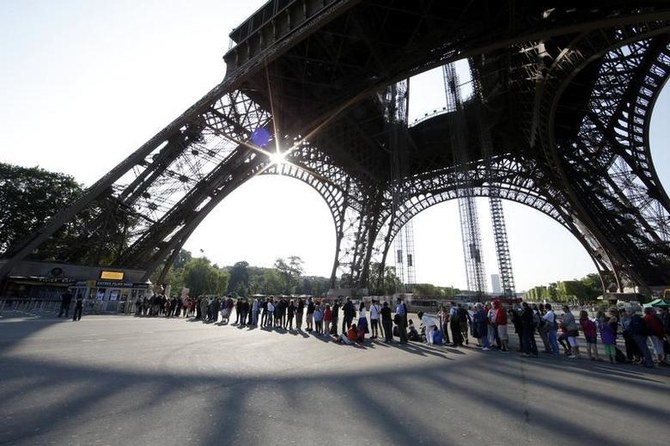PARIS: Airlines and tourism bosses in France reacted with concern on Thursday after US President Donald Trump announced that all flights from most European nations to the US will be suspended for 30 days from Friday.
Bookings were already greatly reduced as a result of concerns about the coronavirus pandemic, and many Americans already in France cut short their stays following Trump’s televised address on Wednesday night.
Bruno Le Maire, the French minister of finance and economy, said he regrets the US decision, which was made without consulting France or any other European nations. It is bad for all airlines, he added, especially national carrier Air France.
Hadia Maaraoui, manager of the Centre des Voyageurs travel agency in Paris, said that in common with many other countries, the tourism sector in France has been deeply affected by the Covid-19 outbreak.
The number of tourist trips booked through her agency, which specializes in tourism and business travel, and has declined almost to zero, she revealed, adding that people have been calling but not booking. With little or no money flowing into travel and tourism businesses, jobs are increasingly at risk.
“Fortunately, France has decided to set up a partial unemployment plan whereby an employee can work 21 hours a week and the rest is funded by the state for the period,” said Maaraoui. “This is certainly not enough because the social cost is high and we are obliged to maintain a minimum service because we cannot close.”
One of the reasons for this is that they have clients who have been stranded by travel bans around the world, including in the Middle East.
“We have travelers whose destination is the Arab world and they are stuck,” she said. “There are travelers who left Lebanon on business trips, went to Kuwait and from there to Dubai for business meetings. They have been unable to return to Kuwait from Dubai for the past 14 days as they have Lebanese stamps in their passports. They are stranded in Dubai which has closed its borders with Kuwait. These travelers have to pay for hotel rooms in Dubai until March 26.”
Authorities in Beirut announced on Wednesday that flights between Lebanon and France will be suspended for a week from Monday, but Maaraoui said many Lebanese clients intend to proceed with their trips.
“The Lebanese are courageous,” she said. “There are four days before the suspension of flights, which will last until next Sunday, and they do not want to cancel their trips even if the ban is extended. They say they want to go and stay longer.”
Those who are less adventurous and wish to cancel or postpone their trips could face financial penalties, as many cheaper tickets are non-refundable, although some airlines might allow dates to be changed free of charge in the circumstances.
“Air France does not reimburse for non-refundable tickets but it has said that if someone wants to cancel, he or she can have a voucher, valid for one year, that allows them to change the flight dates,” said Maaraoui,
“It is terrible and we are very sorry because every phone call we receive is a request to solve a problem.”
French President Emmanuel Macron on Thursday described the pandemic as the worst health crisis France has witnessed in a century.
“As of Monday, schools and universities will have to close,” he said. “We are only at the beginning of this epidemic.”
He also advised people not to leave their homes any more than is necessary, but said public transport will continue to operate as normal.






















